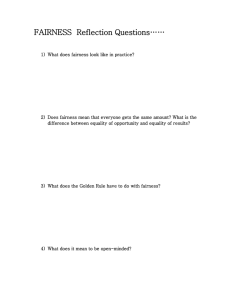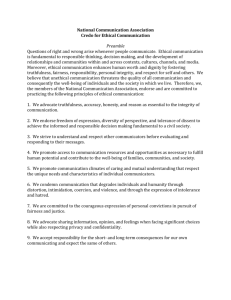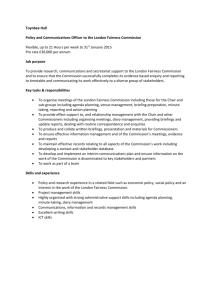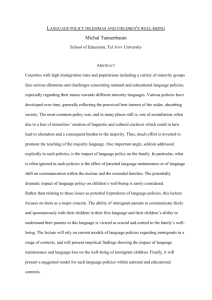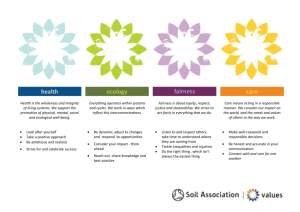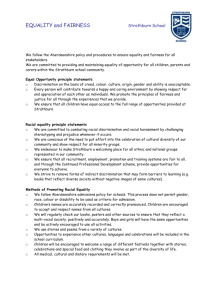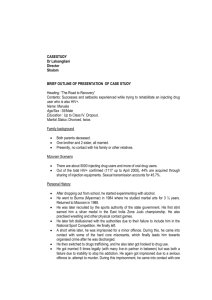How do We Address Human Needs and Wants in Health Care
advertisement
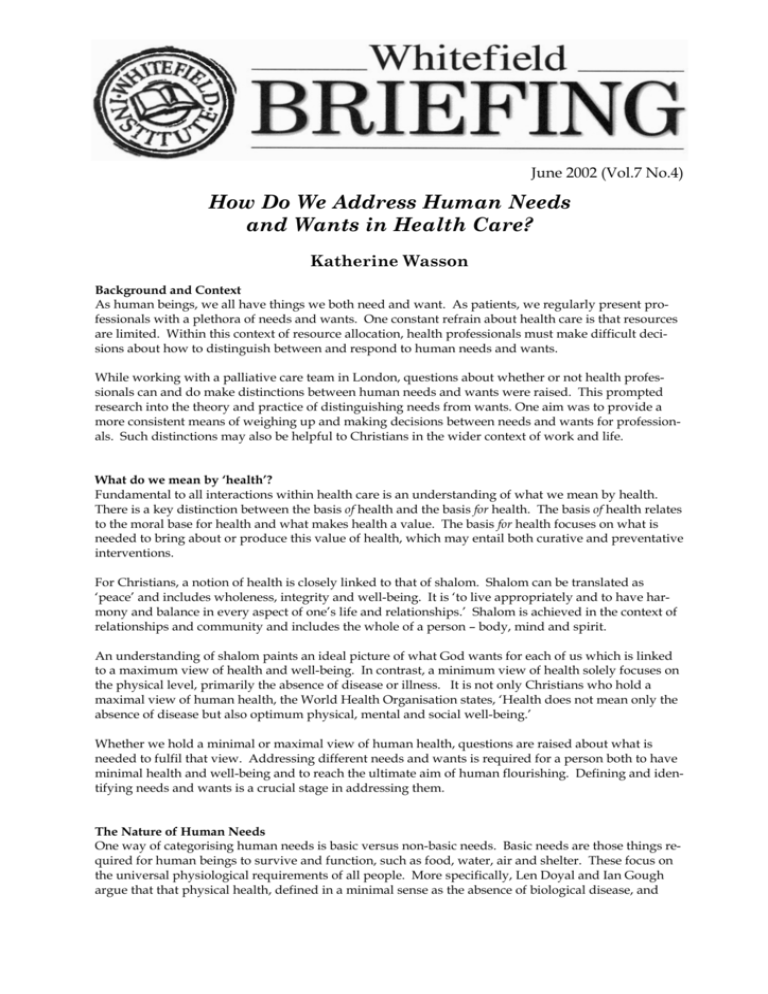
June 2002 (Vol.7 No.4) How Do We Address Human Needs and Wants in Health Care? Katherine Wasson Background and Context As human beings, we all have things we both need and want. As patients, we regularly present professionals with a plethora of needs and wants. One constant refrain about health care is that resources are limited. Within this context of resource allocation, health professionals must make difficult decisions about how to distinguish between and respond to human needs and wants. While working with a palliative care team in London, questions about whether or not health professionals can and do make distinctions between human needs and wants were raised. This prompted research into the theory and practice of distinguishing needs from wants. One aim was to provide a more consistent means of weighing up and making decisions between needs and wants for professionals. Such distinctions may also be helpful to Christians in the wider context of work and life. What do we mean by ‘health’? Fundamental to all interactions within health care is an understanding of what we mean by health. There is a key distinction between the basis of health and the basis for health. The basis of health relates to the moral base for health and what makes health a value. The basis for health focuses on what is needed to bring about or produce this value of health, which may entail both curative and preventative interventions. For Christians, a notion of health is closely linked to that of shalom. Shalom can be translated as ‘peace’ and includes wholeness, integrity and well-being. It is ‘to live appropriately and to have harmony and balance in every aspect of one’s life and relationships.’ Shalom is achieved in the context of relationships and community and includes the whole of a person – body, mind and spirit. An understanding of shalom paints an ideal picture of what God wants for each of us which is linked to a maximum view of health and well-being. In contrast, a minimum view of health solely focuses on the physical level, primarily the absence of disease or illness. It is not only Christians who hold a maximal view of human health, the World Health Organisation states, ‘Health does not mean only the absence of disease but also optimum physical, mental and social well-being.’ Whether we hold a minimal or maximal view of human health, questions are raised about what is needed to fulfil that view. Addressing different needs and wants is required for a person both to have minimal health and well-being and to reach the ultimate aim of human flourishing. Defining and identifying needs and wants is a crucial stage in addressing them. The Nature of Human Needs One way of categorising human needs is basic versus non-basic needs. Basic needs are those things required for human beings to survive and function, such as food, water, air and shelter. These focus on the universal physiological requirements of all people. More specifically, Len Doyal and Ian Gough argue that that physical health, defined in a minimal sense as the absence of biological disease, and autonomy are the most basic human needs and must be satisfied to some degree for people to be able to participate effectively in life. Meeting basic needs is important because it prevents ‘serious harm’ to individuals. Non-basic needs are not required for basic physical survival, but contribute to our psychological, social and spiritual well-being. Abraham Maslow argues there is a hierarchy of human needs (diagram 1) and that lower level needs must be satisfied before individuals can focus on higher level needs. Within this hierarchy, physiological and safety needs could be considered basic needs, as they are necessary for human beings to survive and avoid harm, both physical and psychological. The third and fourth levels involve our relationships and psychological wellbeing and may be classified as non-basic needs. People can survive and avoid harm without having these needs met, but optimum well-being will remain ellusive without them. The final level may focus more on individual’s wants and desires. (diagram 2) Exploring and fulfilling these needs and wants is a key element in helping people to flourish and achieve shalom. The Nature of Human Wants The concept of want can imply a preference, desire or wish for something. Human wants are related to individual preferences and may or may not coincide with their needs. In health care and the rest of life, an individual may want something he/she does not need, like cosmetic surgery, and need something he/she does not want, like chemotherapy. Alternatively, a person’s wants and needs may be the same, e.g. to be cured of his/her disease. Individual wants and desires can differ from or overlap with needs. Like basic needs, some wants may be universal and objective, namely those things which all people desire to live a healthy and fulfilled life and to achieve shalom, e.g. good health, well-being, happiness, contentment. What these mean and how they are achieved for specific individuals will vary, but the overarching want or desire is the same. Other wants are more subjective, such as where a person wants to live or what type of food he/she prefers to eat, e.g. meat and two vegetables versus a curry. Although some human wants are objective and universal, individual wants, preferences and desires can and do vary from person to person. It can be argued that different weight should be given to wants in contrast to basic needs because they are not necessary for survival. Health professionals often focus on basic needs first, as they are often the most urgent, and then take other needs and wants into account. This may be part of a minimum view of health and the setting of priorities within limited resources. As Christians we may want to strive for a maximal view of health and flourishing. To achieve this we need to assess and make decisions regarding different wants and needs in health care, asking what rights and responsibilities are involved. Rights and Responsibilities Claims to human needs and wants may be based on rights. Since October 2000, certain rights have been enshrined in British law through the ratification of the Human Rights Act 1998. It is unclear whether patients can use these human rights to place demands on health professionals. Article 2 states that patients have a ‘right to life’, while Article 3 gives them the right not to be subjected to ‘torture or to inhumane or degrading treatment or punishment.’ Having a ‘Do Not Resuscitate’ order could be seen as upholding Article 3 while denying the patient of his/her right to life. The implications of human rights in health care, and whether or not professionals have specific responsibilities in relation to them, are not clear. In contrast, the responsibilities attached to legal rights are much clearer. Legal rights serve as a minimum standard in society, below which none of us may fall. They protect people from harm, which is vital if individuals are to survive and function. In this way, they are connected to basic needs. In health care, legal rights enshrine the minimum legal protection and standards of treatment that each patient can expect from health professionals. As Christians, we recognise that these minimum standards are vital in our fallen world as they restrain evil and harm and reinforce good. One of the dangers with the increasing appeal to rights in our society is that they can lead to demands. If someone has a right to a particular treatment, then doctors and nurses have a responsibility to provide it. Patients are free to pressurise doctors and nurses for particular treatments, but professionals are not necessarily obliged to meet any and every demand placed upon them. They must weigh up the appropriateness of the request and the best response to it (within the context of limited resources). A more helpful way of assessing such demands is not based on ‘rights’, but rather entitlements. The notion of entitlement offers help in deciding whether a particular need, want or demand places a corresponding duty on health professionals to meet it. In the UK, patients are entitled to access NHS services, which includes a good quality of care and appropriate treatment. Patients may refuse treatment at any point and may request a second opinion. They are entitled not to be intentionally harmed by their doctor (or other professionals). Entitlement clarifies health care needs as a balance to rights claims and responsibilities. applied. The Bible places greater emphasis on our duties and responsibilities rather than rights. One important aspect of weighing up and assessing rights, entitlements, duties and responsibilities regarding human needs and wants is the notion of justice. Within equity, there is recognition that treating people in exactly the same way may not always be appropriate. It allows a doctor or nurse to use his/her professional judgment about what the best treatment options are for an individual. Equity does not permit the minimum standards of equality and fairness to be compromised, but it does allow for differences in treatment of patients for morally appropriate and justifiable reasons. Considerations of Justice One danger in making decisions between human needs and wants is that they will be unjust, e.g. one patient receives more or better treatment than another. Justice as fairness, equality and equity provides objective standards for such decisions, particularly in light of resource allocation. Just treatment of different needs and wants should involve fair, equal and equitable assessment of them and minimum standards of consistency between cases, while recognising that there may be morally justified reasons for treating people differently. Fairness Determining what is fair can be based on what an individual deserves or merits. In health care, how do we view people who live at risk lifestyles, such as smokers and bungee jumpers? If health care resources were allocated based on our lifestyles rather than need, then most of us would be a little anxious given our diet and level of exercise. Fairness involves a standard of care for all patients which is not solely based on what they deserve or merit through lifestyle. Ultimately, justice as fairness requires that a universal and uniform standard of treatment be maintained for all people. This means treatment of individuals and their needs and wants should be consistent and universalizable. Fairness requires a uniform and universal standard of consistency for assessing people’s needs and wants in health care. Equality Equality, like fairness, highlights a minimum standard below which treatment of people should not fall. Equality requires that similar cases are treated in similar ways and dissimilar cases are treated in dissimilar ways. Inequality is where similar cases are treated in different ways. Equality requires a minimum level of consistency in dealing with cases. It aims to avoid discrimination based on inappropriate grounds, e.g. age, race, sex, religious beliefs. Equity In contrast to equality and fairness, equity allows for differences in treating people. Such differences are permitted only for morally justified reasons. Inequity exists where differences in care and treatment are not morally justified. When treating people in health care, there is a distinction to be made between equal consideration and identical treatment. Equity allows for the most appropriate treatment of needs and wants to be A Christian Response The challenge of assessing and responding to human needs and wants is crystallised within health care, but is not the sole domain or responsibility of health professionals. As Christians, we are called to engage with people and their needs and want on many levels. How should Christians respond to human needs and wants? We should recognise that all of us have needs, whether physical, mental, emotional or spiritual. We should be prepared to meet the needs of others, even if it is at cost to ourselves. The Good Samaritan responded to the needs of the man by the roadside and paid the costs himself. If we want people to flourish and have shalom, then we must focus on total well-being, health and wholeness. This means that physical, mental, emotional and spiritual needs must be addressed. We should guard against the tendency within health care to reduce people to their physical bodies or disease. This reductionism ignores the multiple layers of needs we have and creates an imbalanced approach to treating people. As Christians, we have an opportunity to respond to needs in a more holistic way. Jesus met physical needs when he fed the 5000 and through healing physical ailments. He also recognised people’s fundamental spiritual need for forgiveness and a personal relationship with God. We have an opportunity to recognise and help meet people’s spiritual needs and desires. Yet, sometimes people do not want particular needs to be met. They may refuse our help. This poses a challenge, as we know all people need forgiveness and salvation through Christ. How we draw attention to spiritual needs, as well as how we respond to all kinds of needs, wants and desires, can be a witness to the world about the transforming power of the love of Christ. Self-Actualization Wants Esteem Belongingness/Love Non-Basic Needs Safety Physiological Diagram 1. Abraham Maslow’s Hierarchy of Human Needs Basic Needs Diagram 2.Proposed Parrallel of different human needs with Maslow’s hierarchy Questions for Reflection What are the different needs and wants presented in this situation? What duties and responsibilities do I have to meet them? To what is this person entitled? What is an appropriate Christian response? What is the aim – minimum health or maximum well-being and shalom? What resources are at my disposal and what is the best use of them? REFERENCES 1. This helpful distinction was raised by David Cook. 2. David J Atkinson, David H Field, eds. (1995). The New Dictionary of Christian Ethics and Pastoral Theology. Leicester: IVP, 436. 3. World Health Organization (1975). Technical Report Series 571. Early Detection of Health Impairment in Occupational Exposure to Health Hazards. Geneva: WHO. 4. Len Doyal and Ian Gough (1991). A Theory of Human Need. Basingstoke and London: Macmillan. 5. Abraham H Maslow (1987). Motivation and Personality, 3rd edn. Revised by R Fraser, J Fadiman, C McReynolds, R Cox. New York: Harper and Row, ch. 2. 6. Gene Outka (1987). ‘Social Justice and Equal Access to Health Care,’ in On Moral Medicine: theological perspectives in medical ethics. S E Lammers and A Verhey, eds. Grand Rapids: Eerdmans, 637-38. 7. K Wasson (2000). ‘Ethical Arguments for Providing Palliative Care to Non-Cancer Patients.’ International Journal of Palliative Nursing 6:2, 66-70. 8. Aristotle (1980). The Nichomachean Ethics. Translated by David Ross. Oxford: Oxford University Press. 9. Rawls (1971). A Theory of Justice. Cambridge: Belknap and Harvard University Press. 10. RS Downie and E Telfer (1980). Caring and Curing: a philosophy of medicine and social work. New York and London: Methuen. 11. Outka, 639. Note: My thanks are extended to Help the Hospices for funding this research and to David Cook and Rob George for their critical input along the way. Further Reading • A Fergusson (ed) (1993). Health: The strength to be human. Leicester: IVP. • JF Kilner (1990). Who lives? Who dies? Ethical criteria in patient selection. New Haven: Yale University Press. • K Wasson (2002). Resource Allocation. CMF File 17. London: CMF. Katie Wasson is currently a Fellow of the National Cancer Institute (part of National Institutes for Health) in Bethesda, Maryland undertaking research into the ethics of public health and cancer prevention. She worked as a clinical ethicist in London and Oxford for five years after successfully completing her PhD in health care ethics and is a former grantee of the Whitefield Institute.

